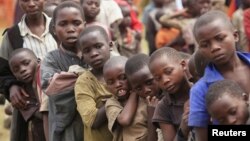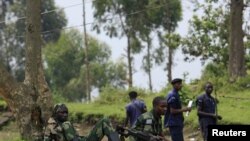KINSHASA, Democratic Republic of Congo — Civilian casualties are growing in the conflict in eastern Democratic Republic of Congo, according to the medical charity Doctors Without Borders. The charity has treated 66 wounded people, mostly civilians, since the weekend at a hospital in Rutshuru, in North Kivu province.
Doctors Without Borders, better known by its French acronym, MSF, has projects to support hospitals in several of the Kivu region’s war zones.
MSF head of mission in Kivu, Patrick Wieland, said that 90 percent
of the patients they have seen since the weekend at the Rutshuru hospital have been civilians.
"The majority of the civilians coming to the hospital are women and children from Rutshuru and the villages around, which is a change in comparison with what we were seeing before," said Wieland. "Since April, until last week, MSF projects in North and South Kivu were seeing mainly combatants and soldiers."
Intensifying violence
MSF also is seeing more severe injuries.
"Lots of them were wounded because of grenades, rockets and heavy machine guns, and this is a change, as well in comparison with what we received before. Now we have got people wounded because of grenades and not only bullets from Kalashnikovs, so the injuries are much more important," said Wieland.
Wieland said it is difficult to tell whether civilians have been deliberately targeted in the recent fighting. Normally, 10,000 to 20,000 people live in Rutshuru and neighboring Kiwanja, but previously they were able to escape fighting in the area or towns fell to the rebels without any resistance. This time the civilians were trapped in the crossfire.
The United Nations has condemned civilian deaths and other abuses committed in the Kivu region since April, when a mutiny broke out in the Congolese army. But observers previously blamed the worst human-rights violations on other armed groups, not on the M23 rebels or government soldiers.
Humanitarian workers at risk
Doctors Without Borders warns that its own ability to help war victims could be at risk, due to worsening security conditions. The head of mission says it may be difficult to keep Rutshuru hospital supplied.
"An important aspect is the supply of Rutshuru hospital in terms of medications and medical personnel, because the way between Goma and Rutshuru is cut because of military operations, or because of banditry, and the MSF car was the victim of bandits about 10 days ago," said Wieland. "So we have to think about air routes or neighboring countries to bring supplies to Rutshuru hospital."
Wieland said it is important for all sides to respect what medical and other humanitarian workers are doing. If security is not guaranteed, he said, his group would have to consider reducing its operations or even withdrawing from certain places, as it has already withdrawn from another locality, Nandale, in North Kivu.
M23 on the move
Fighting between the M23 and government forces continued Tuesday, according to civil society sources. Omar Kavota, coordinator of a civil society group in North Kivu, said the M23 have pushed westward toward Masisi territory, where they may be able to retrieve caches of buried weapons.
The M23’s advance units are believed to be at Kibumba, 27 kilometers from Goma. Those advance units have not tried so far a direct confrontation with the Congolese troops and U.N. peacekeepers barring the way to Goma.
But Kavota said the rebels may be trying to work their way around those forces. He said he was not confident the U.N. would stop the M23 if the Congolese army fails to put up a fight.
Doctors Without Borders, better known by its French acronym, MSF, has projects to support hospitals in several of the Kivu region’s war zones.
MSF head of mission in Kivu, Patrick Wieland, said that 90 percent
of the patients they have seen since the weekend at the Rutshuru hospital have been civilians.
"The majority of the civilians coming to the hospital are women and children from Rutshuru and the villages around, which is a change in comparison with what we were seeing before," said Wieland. "Since April, until last week, MSF projects in North and South Kivu were seeing mainly combatants and soldiers."
Intensifying violence
MSF also is seeing more severe injuries.
"Lots of them were wounded because of grenades, rockets and heavy machine guns, and this is a change, as well in comparison with what we received before. Now we have got people wounded because of grenades and not only bullets from Kalashnikovs, so the injuries are much more important," said Wieland.
Wieland said it is difficult to tell whether civilians have been deliberately targeted in the recent fighting. Normally, 10,000 to 20,000 people live in Rutshuru and neighboring Kiwanja, but previously they were able to escape fighting in the area or towns fell to the rebels without any resistance. This time the civilians were trapped in the crossfire.
The United Nations has condemned civilian deaths and other abuses committed in the Kivu region since April, when a mutiny broke out in the Congolese army. But observers previously blamed the worst human-rights violations on other armed groups, not on the M23 rebels or government soldiers.
Humanitarian workers at risk
Doctors Without Borders warns that its own ability to help war victims could be at risk, due to worsening security conditions. The head of mission says it may be difficult to keep Rutshuru hospital supplied.
"An important aspect is the supply of Rutshuru hospital in terms of medications and medical personnel, because the way between Goma and Rutshuru is cut because of military operations, or because of banditry, and the MSF car was the victim of bandits about 10 days ago," said Wieland. "So we have to think about air routes or neighboring countries to bring supplies to Rutshuru hospital."
Wieland said it is important for all sides to respect what medical and other humanitarian workers are doing. If security is not guaranteed, he said, his group would have to consider reducing its operations or even withdrawing from certain places, as it has already withdrawn from another locality, Nandale, in North Kivu.
M23 on the move
Fighting between the M23 and government forces continued Tuesday, according to civil society sources. Omar Kavota, coordinator of a civil society group in North Kivu, said the M23 have pushed westward toward Masisi territory, where they may be able to retrieve caches of buried weapons.
The M23’s advance units are believed to be at Kibumba, 27 kilometers from Goma. Those advance units have not tried so far a direct confrontation with the Congolese troops and U.N. peacekeepers barring the way to Goma.
But Kavota said the rebels may be trying to work their way around those forces. He said he was not confident the U.N. would stop the M23 if the Congolese army fails to put up a fight.












